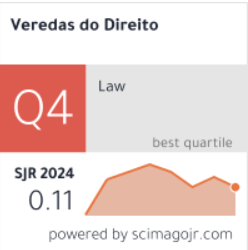URBAN LAND REGULARIZATION: REFLECTIONS ON ITS POTENTIAL AS AN URBAN AND HUMAN DEVELOPMENT POLICY
DOI:
https://doi.org/10.18623/rvd.v22.2822Abstract
Based on the conceptual debate of the “development” category, this paper aims to analyze how sustainable urban land regularization (REURB) can qualify as an urban and human development policy. This is because the Brazilian urban scenario is strongly impacted by inequality of access and lack of infrastructure for less socioeconomically favored sectors, which directly impacts people’s way of life, their possibilities of choices, and access to rights. Thus, since REURB is an alternative to reduce social inequalities via the democratization of access to urban land and protection of the right to decent housing, it is worth asking: How does REURB qualify as a development policy? To propose reflections in this regard, the paper adopted a bibliographic review with a qualitative approach as its methodology, in addition to normative analysis considering Law 13.465/2017 as its main framework. The preliminary conclusions suggest that REURB qualifies as an urban and human development policy as long as it is planned and implemented considering the multiple characteristics of the intervention area and its occupants, in addition to having popular participation as a methodological premise.
Published
How to Cite
Issue
Section
License
I (we) submit this article which is original and unpublished, of my (our) own authorship, to the evaluation of the Veredas do Direito Journal, and agree that the related copyrights will become exclusive property of the Journal, being prohibited any partial or total copy in any other part or other printed or online communication vehicle dissociated from the Veredas do Direito Journal, without the necessary and prior authorization that should be requested in writing to Editor in Chief. I (we) also declare that there is no conflict of interest between the articles theme, the author (s) and enterprises, institutions or individuals.
I (we) recognize that the Veredas do Direito Journal is licensed under a CREATIVE COMMONS LICENSE.
Licença Creative Commons Attribution 3.0







